16 start with N start with N

After World War II, the United States and Canada, two countries that were very similar in many ways, struck out on radically divergent paths to public health insurance. Canada developed a universal single-payer system of national health care, while the United States opted for a dual system that combines public health insurance for low-income and senior residents with private, primarily employer-provided health insurance—or no insurance—for everyone else. In National Health Insurance in the United States and Canada, Gerard W. Boychuk probes the historical development of health care in each country, honing in on the most distinctive social and political aspects of each country—the politics of race in the U.S. and territorial politics in Canada, especially the tensions between the national government and the province of Quebec.
In addition to the politics of race and territory, Boychuk sifts through the numerous factors shaping health policy, including national values, political culture and institutions, the power of special interests, and the impact of strategic choices made at critical junctures. Drawing on historical archives, oral histories, and public opinion data, he presents a nuanced and thoughtful analysis of the evolution of the two systems, compares them as they exist today, and reflects on how each is poised to meet the challenges of the future.

In our increasingly globalized world, U.S. trade policy stands at the intersection of foreign and domestic affairs. This book explains trade policy in terms of domestic politics, presenting a concise account of its origins and political significance.
Although trade policy is a component of foreign policy, Philip A. Mundo explains how it is rooted in the domestic policy process and carries with it enormous implications for domestic affairs. He reviews the growing importance of trade policy since World War II — particularly over the past twenty years — and shows how recent policies like NAFTA are shaped by the domestic agenda.
Mundo explains trade policy as the product of a three-stage process comprising agenda setting, program adoption, and implementation. He reviews this process in terms of the ideas that inform trade policy, the interests that seek to influence it, and the institutions that shape it. He also addresses the importance of specific measures, such as administrative relief and trade sanctions.
This book distills the essence of the trade policy process into a concise, innovative framework accessible to students and general readers. With the growing importance of trade policy, it makes explicit many of the subtleties surrounding policymaking while fully explicating the legal and international context in which trade operates.
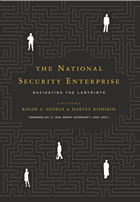
Recent breakdowns in American national security have exposed the weaknesses of the nation’s vast overlapping security and foreign policy bureaucracy and the often dysfunctional interagency process. In the literature of national security studies, however, surprisingly little attention is given to the specific dynamics or underlying organizational cultures that often drive the bureaucratic politics of U.S. security policy.
The National Security Enterprise offers a broad overview and analysis of the many government agencies involved in national security issues, the interagency process, Congressional checks and balances, and the influence of private sector organizations. The chapters cover the National Security Council, the Departments of Defense and State, the Office of the Director of National Intelligence, the Central Intelligence Agency, the Federal Bureau of Investigation, the Department of Homeland Security, and the Office of Management and Budget. The book also focuses on the roles of Congress, the Supreme Court, and outside players in the national security process like the media, think tanks, and lobbyists. Each chapter details the organizational culture and personality of these institutions so that readers can better understand the mindsets that drive these organizations and their roles in the policy process.
Many of the contributors to this volume are long-time practitioners who have spent most of their careers working for these organizations. As such, they offer unique insights into how diplomats, military officers, civilian analysts, spies, and law enforcement officials are distinct breeds of policymakers and political actors. To illustrate how different agencies can behave in the face of a common challenge, contributors reflect in detail on their respective agency’s behavior during the Iraq War.
This impressive volume is suitable for academic studies at both the undergraduate and graduate level; ideal for U.S. government, military, and national security training programs; and useful for practitioners and specialists in national security studies.

This second edition of The National Security Enterprise provides practitioners’ insights into the operation, missions, and organizational cultures of the principal national security agencies and other institutions that shape the US national security decision-making process. Unlike some textbooks on American foreign policy, it offers analysis from insiders who have worked at the National Security Council, the State and Defense Departments, the intelligence community, and the other critical government entities. The book explains how organizational missions and cultures create the labyrinth in which a coherent national security policy must be fashioned. Understanding and appreciating these organizations and their cultures is essential for formulating and implementing it. Taking into account the changes introduced by the Obama administration, the second edition includes four new or entirely revised chapters (Congress, Department of Homeland Security, Treasury, and USAID) and updates to the text throughout. It covers changes instituted since the first edition was published in 2011, implications of the government campaign to prosecute leaks, and lessons learned from more than a decade of war in Afghanistan and Iraq. This up-to-date book will appeal to students of US national security and foreign policy as well as career policymakers.
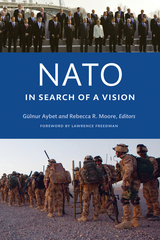
As the NATO Alliance enters its seventh decade, it finds itself involved in an array of military missions ranging from Afghanistan to Kosovo to Sudan. It also stands at the center of a host of regional and global partnerships. Yet, NATO has still to articulate a grand strategic vision designed to determine how, when, and where its capabilities should be used, the values underpinning its new missions, and its relationship to other international actors such as the European Union and the United Nations.
The drafting of a new strategic concept, begun during NATO’s 60th anniversary summit, presents an opportunity to shape a new transatlantic vision that is anchored in the liberal democratic principles so crucial to NATO’s successes during its Cold War years. Furthermore, that vision should be focused on equipping the Alliance to anticipate and address the increasingly global and less predictable threats of the post-9/11 world.
This volume brings together scholars and policy experts from both sides of the Atlantic to examine the key issues that NATO must address in formulating a new strategic vision. With thoughtful and reasoned analysis, it offers both an assessment of NATO’s recent evolution and an analysis of where the Alliance must go if it is to remain relevant in the twenty-first century.

NATO’s 2010 Strategic Concept officially broadened the alliance’s mission beyond collective defense, reflecting a peaceful Europe and changes in alliance activities. NATO had become an international security facilitator, a crisis-manager even outside Europe, and a liberal democratic club as much as a mutual-defense organization. However, Russia’s re-entry into great power politics has changed NATO’s strategic calculus.
Russia’s aggressive annexation of Crimea in 2014 and its ongoing military support for Ukrainian separatists dramatically altered the strategic environment and called into question the liberal European security order. States bordering Russia, many of which are now NATO members, are worried, and the alliance is divided over assessments of Russia’s behavior. Against the backdrop of Russia’s new assertiveness, an international group of scholars examines a broad range of issues in the interest of not only explaining recent alliance developments but also making recommendations about critical choices confronting the NATO allies. While a renewed emphasis on collective defense is clearly a priority, this volume’s contributors caution against an overcorrection, which would leave the alliance too inwardly focused, play into Russia’s hand, and exacerbate regional fault lines always just below the surface at NATO. This volume places rapid-fire events in theoretical perspective and will be useful to foreign policy students, scholars, and practitioners alike.

Rooted in Western classical and medieval philosophies, the natural law movement of the last few decades seeks to rediscover fundamental moral truths. In this book, prominent thinkers demonstrate how natural law can be used to resolve a wide range of complex social, political, and constitutional issues by addressing controversial subjects that include the family, taxation, war, racial discrimination, medical technology, and sexuality.
This volume will be of value to those working in philosophy, political science, and legal theory, as well as to policy analysts, legislators, and judges.

Germain Grisez has been a leading voice in moral philosophy and theology since the Second Vatican Council. In this book, such major thinkers as John Finnis, Ralph McInerny, and William E. May consider issues in ethics, metaphysics, and politics that have been central to Grisez's work.
Grisez's reconsideration of the philosophical foundations of Christian moral teaching, seeking to eliminate both legalistic interpretation and theological dissent, has won the support of a number of leading Catholic moralists. In the past decade, moreover, many philosophers outside of Catholicism have weighed carefully Grisez's alternatives to theories that have long dominated secular moral philosophy.
This book presents a broad spectrum of viewpoints on subjects ranging from contraception to capital punishment and considers such controversies as the scriptural basis of Grisez's work his interpretations of Aquinas, and his new natural law theory. The collection includes not only contributions from Grisez's supporters but also from critics of his thought, from proportionalist Edward Collins Vacek, SJ, to the neo-Thomist Ralph McInerny. A reply by Grisez, written with Joseph M. Boyle Jr., addresses the issues and viewpoints expressed, while an afterword by Russell Shaw reviews Grisez's pioneering work and conveys a vivid sense of the philosopher's personality.
As Grisez's influence grows, this volume will serve as an important touchstone on his contributions to moral and political philosophy and theology.

"Public reason" is one of the central concepts in modern liberal political theory. As articulated by John Rawls, it presents a way to overcome the difficulties created by intractable differences among citizens' religious and moral beliefs by strictly confining the place of such convictions in the public sphere.
Identifying this conception as a key point of conflict, this book presents a debate among contemporary natural law and liberal political theorists on the definition and validity of the idea of public reason. Its distinguished contributors examine the consequences of interpreting public reason more broadly as "right reason," according to natural law theory, versus understanding it in the narrower sense in which Rawls intended. They test public reason by examining its implications for current issues, confronting the questions of abortion and slavery and matters relating to citizenship.
This energetic exchange advances our understanding of both Rawls's contribution to political philosophy and the lasting relevance of natural law. It provides new insights into crucial issues facing society today as it points to new ways of thinking about political theory and practice.

The first full account of Nazi spies in 1930s America and how they were exposed.
In the mid-1930s just as the United States was embarking on a policy of neutrality, Nazi Germany launched a program of espionage against the unwary nation. The Nazi Spy Ring in America tells the story of Hitler’s attempts to interfere in American affairs by spreading anti-Semitic propaganda, stealing military technology, and mapping US defenses.
This fast-paced history provides essential insight into the role of espionage in shaping American perceptions of Germany in the years leading up to US entry into World War II. Fascinating and thoroughly researched, The Nazi Spy Ring in America sheds light on a now-forgotten but significant episode in the history of international relations and the development of the FBI.
Using recently declassified documents, prize-winning historian Rhodri Jeffreys-Jones narrates this little-known chapter in US history. He shows how Germany’s foreign intelligence service, the Abwehr, was able to steal top secret US technology such as a prototype codebreaking machine and data about the latest fighter planes.
At the center of the story is Leon Turrou, the FBI agent who helped bring down the Nazi spy ring in a case that quickly transformed into a national sensation. The arrest and prosecution of four members of the ring was a high-profile case with all the trappings of fiction: fast cars, louche liaisons, a murder plot, a Manhattan socialite, and a ringleader codenamed Agent Sex. Part of the story of breaking the Nazi spy ring is also the rise and fall of Turrou, whose talent was matched only by his penchant for publicity, which eventually caused him to run afoul of J. Edgar Hoover's strict codes of conduct.
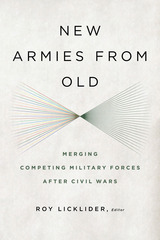
Negotiating a peaceful end to civil wars, which often includes an attempt to bring together former rival military or insurgent factions into a new national army, has been a frequent goal of conflict resolution practitioners since the Cold War. In practice, however, very little is known about what works, and what doesn’t work, in bringing together former opponents to build a lasting peace.
Contributors to this volume assess why some civil wars result in successful military integration while others dissolve into further strife, factionalism, and even renewed civil war. Eleven cases are studied in detail—Sudan, Zimbabwe, Lebanon, Rwanda, the Philippines, South Africa, Mozambique, Bosnia-Herzegovina, Sierra Leone, Democratic Republic of the Congo, and Burundi—while other chapters compare military integration with corporate mergers and discuss some of the hidden costs and risks of merging military forces. New Armies from Old fills a serious gap in our understanding of civil wars, their possible resolution, and how to promote lasting peace, and will be of interest to scholars and students of conflict resolution, international affairs, and peace and security studies.
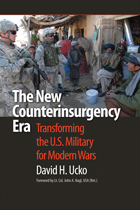
Confronting insurgent violence in Iraq and Afghanistan, the U.S. military has recognized the need to “re-learn” counterinsurgency. But how has the Department of Defense with its mixed efforts responded to this new strategic environment? Has it learned anything from past failures?
In The New Counterinsurgency Era, David Ucko examines DoD’s institutional obstacles and initially slow response to a changing strategic reality. Ucko also suggests how the military can better prepare for the unique challenges of modern warfare, where it is charged with everything from providing security to supporting reconstruction to establishing basic governance—all while stabilizing conquered territory and engaging with local populations. After briefly surveying the history of American counterinsurgency operations, Ucko focuses on measures the military has taken since 2001 to relearn old lessons about counterinsurgency, to improve its ability to conduct stability operations, to change the institutional bias against counterinsurgency, and to account for successes gained from the learning process.
Given the effectiveness of insurgent tactics, the frequency of operations aimed at building local capacity, and the danger of ungoverned spaces acting as havens for hostile groups, the military must acquire new skills to confront irregular threats in future wars. Ucko clearly shows that the opportunity to come to grips with counterinsurgency is matched in magnitude only by the cost of failing to do so.

After World War II dozens of non-governmental organizations (NGOs) emerged on the global scene, committed to improving the lives of the world's most vulnerable people. Some focused on protecting human rights; some were dedicated to development, aimed at satisfying basic economic needs. Both approaches had distinctive methods, missions, and emphases. In the 1980s and 90s, however, the dividing line began to blur.
In the first book to track the growing intersection and even overlap of human rights and development NGOs, Paul Nelson and Ellen Dorsey introduce a concept they call "new rights advocacy." New rights advocacy has at its core three main trends: the embrace of human rights-based approaches by influential development NGOs, the adoption of active economic and social rights agendas by major international human rights NGOs, and the surge of work on economic and social policy through a human rights lens by specialized human rights NGOs and social movement campaigns.
Nelson and Dorsey draw on rich case studies of internationally well-known individual NGOs such as Amnesty International, Human Rights Watch, Oxfam, CARE, ActionAid, and Save the Children, and employ perspectives from fields of human rights, international relations, the sociology of social movements and of complex organizations, and development theory, in order to better understand the changes occurring within NGOs.
In questioning current trends using new theoretical frameworks, this book breaks new ground in the evolution of human rights-development interaction. The way in which NGOs are reinventing themselves has great potential for success—or possibly failure—and profound implications for a world in which the enormous gap between the wealthiest and poorest poses a persistent challenge to both development and human rights.

A timely philosophical treatment of the current wave of international terrorism and armed conflicts around the world, New Terror, New Wars explores the ethical significance of September 11, and its aftermath. From the nationalistic violence that reigned over the last century, to the amorphous terrors without national boundaries characterizing the opening of this new century, Gilbert leads the way through some of the difficult terrain that has brought the world to these troubling crossroads. He examines the causes of new wars as they are made manifest in the politics of identity, he questions when military force is justified in the pursuit of political goals. He asks whether the "just war" theory is adequate for evaluating and then regulating contemporary conflicts. He deals with the core issues of traditional conflict: self-defense, the conduct of war, hatred and revenge, but also with newer forms, such as conflict in the guise of "humanitarian intervention."
The hopeful conclusion to all wars is, of course, the restoration of peace. Gilbert concludes with a philosophical investigation of not only how to end them, but also how to resolve the conflicts that gave rise to them in the first place and how to produce the conditions in which they are unlikely to occur again—reminding us that the end to a "just war" must be a "just peace" and outlining what the nature of that just peace should be. New Terror, New Wars will be required reading for all those concerned with the ethical issues that inevitably arise from armed conflicts in whatever dire form they may take.

North Korea is perilously close to developing strategic nuclear weapons capable of hitting the United States and its East Asian allies. Since their first nuclear test in 2006, North Korea has struggled to perfect the required delivery systems. Kim Jong-un’s regime now appears to be close, however. Sung Chull Kim, Michael D. Cohen, and the volume contributors contend that the time to prevent North Korea from achieving this capability is virtually over; scholars and policymakers must turn their attention to how to deter a nuclear North Korea. The United States, South Korea, and Japan must also come to terms with the fact that North Korea will be able to deter them with its nuclear arsenal. How will the erratic Kim Jong-un behave when North Korea develops the capability to hit medium- and long-range targets with nuclear weapons? How will and should the United States, South Korea, Japan, and China respond, and what will this mean for regional stability in the short term and long term? The international group of authors in this volume address these questions and offer a timely analysis of the consequences of an operational North Korean nuclear capability for international security.
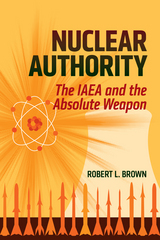
Once dismissed as ineffectual, the International Atomic Energy Agency (IAEA) has in the past twenty years emerged as a powerful international organization. Member states allow the IAEA to render judgment on matters vital to peace and security while nations around the globe comply with its rules and commands on proliferation, safety, and a range of other issues.
Robert L. Brown details the IAEA’s role in facilitating both control of nuclear weapons and the safe exploitation of nuclear power. As he shows, the IAEA has acquired a surprising amount of power as states, for political and technological reasons, turn to it to supply policy cooperation and to act as an agent for their security and safety. The agency’s success in gaining and holding authority rests in part on its ability to apply politically neutral expertise that produces beneficial policy outcomes. But Brown also delves into the puzzle of how an agency created by states to aid cooperation has acquired power over them.
READERS
Browse our collection.
PUBLISHERS
See BiblioVault's publisher services.
STUDENT SERVICES
Files for college accessibility offices.
UChicago Accessibility Resources
home | accessibility | search | about | contact us
BiblioVault ® 2001 - 2024
The University of Chicago Press









